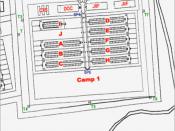For this case analysis I will use the article from Part V, "Rationality and Non-Rationality in Organizational Decision Making," in reference to "Standard Operating Procedures." Standard Operating Procedures are often implemented to reduce or simplify problems, decrease the decision making process, create a fixed routine; our text states that, "organizations try to simplify problems" (Handel, 2003, 181) in using Standard Operating Procedures. Accordingly, Standard Operating Procedures are common in military organizations; whether one is referring to the Air Force, Navy, and Marines etc. In the Navy, for example, generally every command/unit/department or station has a SOP (Standard Operating Procedure) to complete tasks/procedures. The SOP can also be considered as an implemented, "programmed behavior" (Handel, 2003, 181). For example, when referring to decision making, a command/unit/department etc. establishes guidelines or a set of rules for employees to follow; by doing so it will limit the amount of time spent on the decision making process and it will allow for a fixed routine.
Overall, this will decrease the potential for problems and hazards/accidents in the working environment. Essentially, the SOP controls its employees/workers; ultimately, the SOP becomes a standardized way in doing business. Moreover, when dealing with the military, uniformity is important; the SOP is just one aspect of uniformity in the military.
As stated earlier, the SOP is considered a "programmed behavior," in which Handel explains as following an SOP, "involves little search, deliberation, active problem solving or conscience choice" (Handel, 2003, 181). Basically, the SOP can "simplify procedures." In addition, costs are also considered when recognizing the idea behind an SOP. For example, Handel states that organizations devote a lot of, "time and attention to gathering information and problem solving" (Handel, 2003, 181); this is not free.


